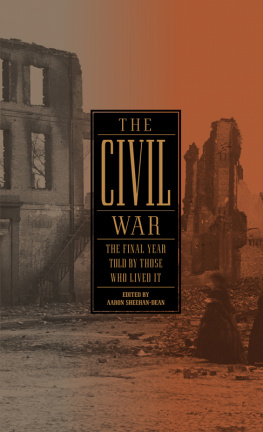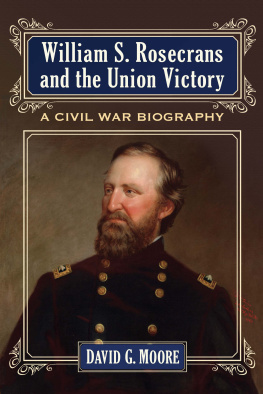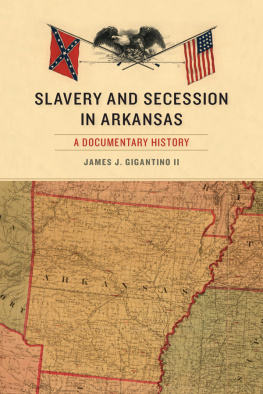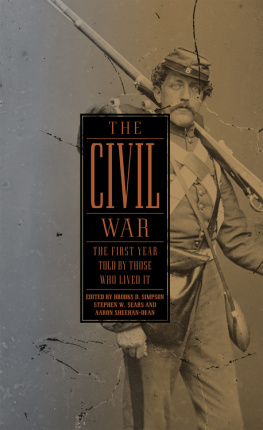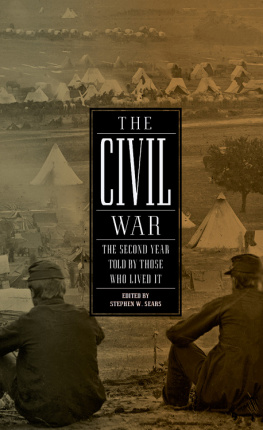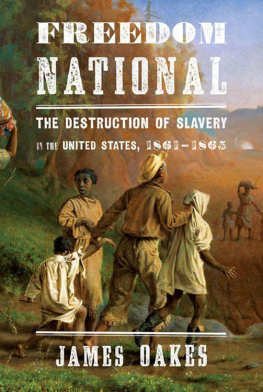
THE CIVIL WAR
THE FINAL YEAR TOLD BY THOSE WHO LIVED IT
Aaron Sheehan-Dean, editor

THE LIBRARY OF AMERICA
Volume compilation, preface, introduction, notes, and chronology copyright 2014 by Literary Classics of the United States, Inc., New York, N.Y.
All rights reserved.
No part of the book may be reproduced commercially by offset-lithographic or equivalent copying devices without the permission of the publisher.
Some of the material in this volume is reprinted by permission of the holders of copyright and publication rights. Every effort has been made to contact the copyright holders.
If an owner has been unintentionally omitted, acknowledgment will gladly be made in future printings.
See Note on the Texts on for further information.
THE LIBRARY OF AMERICA, a nonprofit publisher, is dedicated to publishing, and keeping in print, authoritative editions of Americas best and most significant writing. Each year the Library adds new volumes to its collection of essential works by Americas foremost novelists, poets, essayists, journalists, and statesmen.
If you would like to request a free catalog and find out more about The Library of America, please visit with your name and address. Include your e-mail address if you would like to receive our occasional newsletter with items of interest to readers of classic American literature and exclusive interviews with Library of America authors and editors (we will never share your e-mail address).
Distributed to the trade in the United States by Penguin Group (USA) Inc. and in Canada by Penguin Books Canada Ltd.
Library of Congress Control Number for the Print Edition: 2013941526
ISBN 9781598532944 (print)
ISBN 9781598533019 (epub)
The Library of America250
Manufactured in the United States of America
The Civil War:
The Final Year Told by Those Who Lived It
is published with support from
THE ANDREW W. MELLON FOUNDATION
and
THE NATIONAL ENDOWMENT FOR THE HUMANITIES
The Civil War: The Final Year Told by Those Who Lived It
is kept in print by a gift from
THE BERKLEY FOUNDATION
the Guardians of American Letters Fund, established by The Library of America to ensure that every volume in the series will be permanently available.
Preface
Has there ever been another historical crisis of the magnitude of 186165 in which so many people were so articulate?
Edmund Wilson
T HIS Library of America volume is the last in a four-volume series bringing together memorable and significant writing by participants in the American Civil War. Each volume in the series covers approximately one year of the conflict, from the election of Abraham Lincoln in November 1860 to the end of the war in the spring of 1865, and presents a chronological selection of documents from the broadest possible range of authoritative sourcesdiaries, letters, speeches, military reports, newspaper articles, memoirs, poems, and public papers. Drawing upon an immense and unique body of American writing, the series offers a narrative of the war years that encompasses military and political events and their social and personal reverberations. Created by persons of every class and condition, the writing included here captures the American nation and the American language in the crucial period of their modern formation. Selections have been chosen for their historical significance, their literary quality, and their narrative energy, and are printed from the best available sources. The goal has been to shape a narrative that is both broad and balanced in scope, while at the same time doing justice to the number and diversity of voices and perspectives preserved for us in the writing of the era.
Introduction
O N March 8, 1864, Ulysses S. Grant arrived in Washington, D.C., to take command of the armies of the United States, but before he could lead them against the Confederacy, he needed to be introduced to the capital. After meeting President Lincoln for the first time, Grant found himself the center of attention at a White House reception. By the end of the night the modest rumpled man who had been working as a store clerk when the war began was standing on a sofa so that onlookers could catch a glimpse of the general they hoped would save the nations military fortunes. Grants victories at Vicksburg and Chattanooga had made him the preeminent Union commander of the war, but he had yet to prove his mettle against Robert E. Lee and his formidable Army of Northern Virginia. Nor was it certain that President Lincoln would be reelected in the fall of 1864, or if he was defeated, that his successor would be willing, or able, to continue the conflict. As the sundered nation began its fourth year of war, both sides could still find reasons to hope that their faith in victory might be rewarded in the months ahead.
The previous year had not begun well for the Union. After its disastrous defeat at Fredericksburg under Ambrose Burnside in December 1862, the Army of the Potomac had suffered from widespread demoralization, alarming desertion rates, and intrigues among its senior generals. Lincolns decision in January 1863 to replace Burnside with Joseph Hooker helped restore the armys morale, but Hookers offensive across the Rappahannock River in May ended in a humiliating repulse at Chancellorsville. Confronted by a numerically superior opponent, Lee demonstrated his characteristic audacity by dividing his army and launching a series of counterattacks that drove Hooker back across the river. Although Chancellorsville cost the Confederacy 13,000 men killed, wounded, or missing, the battle bolstered Lees already high confidence in the ability of his troops. Determined to seize the strategic initiative in the east, Lee invaded Pennsylvania in June in the hope of gaining a third consecutive victory over the Army of the Potomac. When Hookers successor, George G. Meade, defeated him at Gettysburg in July, Lee managed to escape back across the Potomac into Virginia, where the two opposing commanders maneuvered inconclusively for the remainder of the year. While Lee was aware that the Gettysburg campaign had proved a costly failure, many Southerners considered the battle to have been a draw, while many Northernersespecially President Lincolnunderstood that defensive victories alone would not win the war in the east.
By the end of 1863 there was no uncertainty regarding the ability of the Union to win offensive victories in the western theater. After spending the winter engaged in a series of futile attempts to reach the Confederate stronghold at Vicksburg through the rivers and bayous of the Mississippi Delta, Grant had shown a willingness to take risks equal to Lees. Crossing the Mississippi well below Vicksburg at the beginning of May, Grant had marched his army northeast to Jackson, then turned west to attack his main objective from the rear. Vicksburgs surrender on July 4, the day after the failure of Lees final assault at Gettysburg, gave the Union control of the entire length of the Mississippi and effectively cut Texas, western Louisiana, and Arkansas off from the rest of the Confederacy. The Father of Waters, Lincoln gratefully observed, again goes unvexed to the sea. During the summer of 1863 William S. Rosecrans also succeeded in gaining control of Middle Tennessee for the Union, skillfully maneuvering Braxton Bragg out of a series of defensive positions and forcing him to retreat into northwestern Georgia. Reinforced by Confederate troops from Virginia and Mississippi, Bragg turned on Rosecrans in September and defeated his Army of the Cumberland at Chickamauga. The victory rallied Confederate spirits but proved short-lived. Union forces under Grant broke Braggs siege of Chattanooga, and in November they drove the Confederates off Missionary Ridge and forced them back into northwestern Georgia.
Next page
